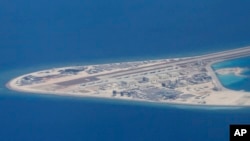China’s increasingly close relations with rivals in Southeast Asia put it in a position to disregard a harsh statement from a powerful group of foreign ministers this month, as well as other rebukes over its expansions in the South China Sea.
Beijing, which has expanded quickly into the vast, contested sea over the past decade, despite competing claims from smaller states, met fresh criticism from the Group of 7 foreign ministers in mid-April.
A G7 joint communique urged countries around the sea to use a world court arbitration ruling against China as a “useful basis” for settling disputes. A tribunal in The Hague ruled last year that Beijing lacked a legal basis for claims to more than 90 percent of the South China Sea, a resource-rich 3.5 million-square-kilometer tract also claimed by five other governments.
“At most (China) will just probably repeat what they’ve been saying about it — it’s a ruling that they don’t really recognize,” said Herman Kraft, political scientist at University of the Philippines Diliman. “I don’t think they’re really going to pay any attention to it that would significantly indicate any change in their position.
“Arguably (the communique) is just one of these statements coming from admittedly international organizations, but international organizations made up of countries that beyond talking about the issue and encouraging China to actually recognize and abide by the ruling, I don’t think they’re really going to do anything about it,” he said.
Ignoring pressure
China can afford to ignore pressure from the G7, the world court ruling or periodic criticism from the United States because it is pursuing peaceful cooperation with countries that directly contest Beijing’s maritime claims, analysts say.
“I think China is not interested in talking about the South China Sea situation, not to further complicate the issue,” said Alexander Huang, strategic studies professor at Tamkang University in Taiwan. “I think basically they consider the situation as under control and nobody is disrupting or trying to disturb the trend or current state of the South China Sea.”
Economic strings
Beijing was working on economic cooperation with the smallest claimant, Brunei, before the arbitration ruling. In Malaysia, despite regular sightings of Chinese coast guard vessels in waters it claims, officials seldom confront China because they count it as their top trading partner and biggest source of direct foreign investment.
China, an $11 trillion-plus economy, has stepped up talks over the past three years with Vietnam, once its harshest maritime rival, on cooperation in the disputed sea.
The Philippines had filed the world court arbitration to resist Chinese coast guard control of a shoal off the archipelago’s west coasts. But President Rodrigo Duterte, who took office last year in Manila, has set aside the dispute to discuss investment.
G7 and Silk Road
The G7 ministers are from Canada, France, Germany, Japan, Italy, the United Kingdom and the United States. None have a claim to the sea, which lies entirely in Asia, but Beijing is looking to Europe for help with its “Silk Road” policy of spreading Chinese investment through central Asia to the Atlantic.
“We reiterate our strong opposition to any unilateral actions which increase tensions, such as the threat or use of force, large scale land reclamation, building of outposts, as well as their use for military purposes and urge all parties to pursue demilitarization of disputed features and to comply with their obligations under international law,” said the communique posted to the G7 website states.
China has used landfill to expand tiny features in the sea’s Paracel and Spartly island chains. Some of those islets are prepped for use by combat aircraft and radar systems, think tank researchers believe.
Other countries report regular sightings of Chinese coast guard vessels in exclusive economic zones extending 370 kilometers off their coasts.
Criticism meets quiet
China called the July 12, 2016, arbitration result a “farce.” It also vented after the G7 ministers criticized its maritime expansion a year ago but has kept quieter this year. Beijing seldom responds to foreign organizations critical of Chinese motives for creating artificial islands for military infrastructure.
Unless one of the Southeast Asian claimants steps up relations with the United States, Beijing can weather any international criticism, analysts say.
The U.S. government disputes Beijing’s efforts to control the South China Sea and has sent naval ships, alarming Beijing. But President Donald Trump has not followed former President Barack Obama’s lead in bolstering military aid for any of the four Southeast Asian claimants.
“China is the biggest winner in the South China Sea contest,” said Lin Chong-pin, a retired professor and former deputy defense minister in Taiwan. “We know that the effects of the world court arbitration ruling actually came to nothing.”





